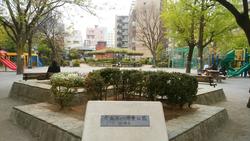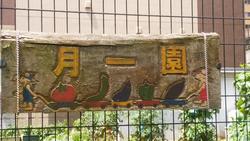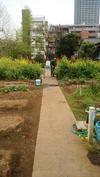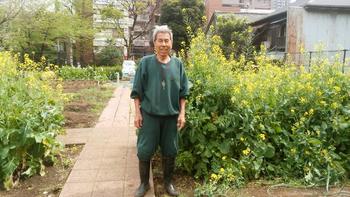![]() Did you know that among the 23 wards, there is the only school in the Tsukishima area in Chuo-ku that has a 25m pool area field? That's Tsukishima Daiichi Elementary School and Kindergarten. Former Tsukishima Daiichi Elementary School / Kindergarten site (4-2-1 Tsukishima, Chuo-ku, 5 minutes on foot from school / kindergarten), the 25m elementary school pool in Tsukishima Daiichi Park has been used as a farm since 1997. . Children and children harvest and eat a lot of "pesticide-free monthly vegetables" every year for educational activities.
Did you know that among the 23 wards, there is the only school in the Tsukishima area in Chuo-ku that has a 25m pool area field? That's Tsukishima Daiichi Elementary School and Kindergarten. Former Tsukishima Daiichi Elementary School / Kindergarten site (4-2-1 Tsukishima, Chuo-ku, 5 minutes on foot from school / kindergarten), the 25m elementary school pool in Tsukishima Daiichi Park has been used as a farm since 1997. . Children and children harvest and eat a lot of "pesticide-free monthly vegetables" every year for educational activities.
![]() When I visited Tsukiichien in April, Shigenobu Tomikawa smiled in a field where canola flower bloomed. Mr. Tomikawa (born on August 20, 1930, soon 87 years old), who lives near Tsukiichien, has been watching the field twice or more every day for 20 years since 1997 and taking care of the field. I am. Today, elementary school children and kindergarten children will come to plant seeds and seedlings in the field in May, so they are preparing for it.
When I visited Tsukiichien in April, Shigenobu Tomikawa smiled in a field where canola flower bloomed. Mr. Tomikawa (born on August 20, 1930, soon 87 years old), who lives near Tsukiichien, has been watching the field twice or more every day for 20 years since 1997 and taking care of the field. I am. Today, elementary school children and kindergarten children will come to plant seeds and seedlings in the field in May, so they are preparing for it.
![]() Thanks to Mr. Tomikawa's watering the morning and evening fields during this intense heat, the cucumber seedlings planted in May grew more vigorously than the height of adults in July. Was.
Thanks to Mr. Tomikawa's watering the morning and evening fields during this intense heat, the cucumber seedlings planted in May grew more vigorously than the height of adults in July. Was. ![]() We covered the harvest of a 5-year-old kindergarten. In June, they harvested onions, potatoes, cucumbers, mini tomatoes, peppers, etc. Today is the ginseng harvest. I'm looking forward to seeing what kind of carrots come out.
We covered the harvest of a 5-year-old kindergarten. In June, they harvested onions, potatoes, cucumbers, mini tomatoes, peppers, etc. Today is the ginseng harvest. I'm looking forward to seeing what kind of carrots come out. ![]() When asked by Dr. Junko Matsubara about the charm of Tsukiichien, he said, "I'm experiencing life watching the plants grow and change every day, and experiencing the leaves and the touch. Looking at the children who are surprised at the vegetables of various shapes and sizes that are different from the vegetables in the store, all children are stimulated by their five senses and have a rich sense of sensibilities. .
When asked by Dr. Junko Matsubara about the charm of Tsukiichien, he said, "I'm experiencing life watching the plants grow and change every day, and experiencing the leaves and the touch. Looking at the children who are surprised at the vegetables of various shapes and sizes that are different from the vegetables in the store, all children are stimulated by their five senses and have a rich sense of sensibilities. . ![]() There is a three-year cultivation plan, mainly 5-year-olds use `` Tsukiichien '', and 3-year-olds start digging sweet potatoes planted by 5-year-olds with their parents in October, Plant seed potatoes in February of the 4-year-olds. Other vegetables are also grown in planters in nearby gardens.
There is a three-year cultivation plan, mainly 5-year-olds use `` Tsukiichien '', and 3-year-olds start digging sweet potatoes planted by 5-year-olds with their parents in October, Plant seed potatoes in February of the 4-year-olds. Other vegetables are also grown in planters in nearby gardens.
![]() Ayako Okawa, the teacher in charge of the sweet potatoes planted in May, shows the children that "sweet potato leaves and vines are growing so much." “Blue tomatoes, don’t they turn red soon? You can't eat it yet. "A little more, I found a big cucumber here."
Ayako Okawa, the teacher in charge of the sweet potatoes planted in May, shows the children that "sweet potato leaves and vines are growing so much." “Blue tomatoes, don’t they turn red soon? You can't eat it yet. "A little more, I found a big cucumber here."



![]() “Peyman, he’s getting bigger. It's a little more." "It's baby corn" The children entering the tall vegetables are feeling like an expedition.
“Peyman, he’s getting bigger. It's a little more." "It's baby corn" The children entering the tall vegetables are feeling like an expedition.



![]() "The carrots were dug. Me too. Me too. Look at it!” he was very excited. Each person carried a lot of carrots to the kindergarten in a spar bag. "Let's count the number of carrots side by side," Mr. Emi Yoshizawa said, "Which carrots are bigger?" We all compared the length and thickness and chose the carrot champion.
"The carrots were dug. Me too. Me too. Look at it!” he was very excited. Each person carried a lot of carrots to the kindergarten in a spar bag. "Let's count the number of carrots side by side," Mr. Emi Yoshizawa said, "Which carrots are bigger?" We all compared the length and thickness and chose the carrot champion.
![]() July 13th was a curry party day for a 5-year-old child.
July 13th was a curry party day for a 5-year-old child.



![]() Children carefully cut carrots, potatoes, and onions with the opposite hand holding a kitchen knife into "cat's hand". I asked the children because they didn't seem to be scared, and they said they practiced cutting vegetables at home using kitchen knives. I agree.
Children carefully cut carrots, potatoes, and onions with the opposite hand holding a kitchen knife into "cat's hand". I asked the children because they didn't seem to be scared, and they said they practiced cutting vegetables at home using kitchen knives. I agree. ![]() I went to see where mothers are making curry in the elementary school home economics room, and the 5-year-olds are happy with the appearance of boiled gutsu and the smell of curry roux.
I went to see where mothers are making curry in the elementary school home economics room, and the 5-year-olds are happy with the appearance of boiled gutsu and the smell of curry roux. ![]() Curry pots were delivered to the nursery room of the 3-year-old, and the 5-year-olds boasted that they had cut the vegetables they grew with a kitchen knife.
Curry pots were delivered to the nursery room of the 3-year-old, and the 5-year-olds boasted that they had cut the vegetables they grew with a kitchen knife.



![]() Dr. Daijiro Watanabe, a 3-year-old child, will pour curry on half the rice in the lunch box. Kids who love curry. In an instant, the meal was finished, and the lunch box was empty. Even if vegetables that you are not good at are included in the curry, "It's delicious. I love curry!”
Dr. Daijiro Watanabe, a 3-year-old child, will pour curry on half the rice in the lunch box. Kids who love curry. In an instant, the meal was finished, and the lunch box was empty. Even if vegetables that you are not good at are included in the curry, "It's delicious. I love curry!” ![]() In the play room, Tomikawa and Mayumi Ikuta (Chief of the Tsukiichien Cooperation Volunteer), who always take care of "Tsukiichien Garden", are invited to the "Curry Party", and 4.5-year-olds are two. I expressed my gratitude for what I wanted to hear and taking care of them. Mr. Tomikawa said, "I'm most happy to see the smiles when the children are harvesting. That is the energy to take care of the field.”
In the play room, Tomikawa and Mayumi Ikuta (Chief of the Tsukiichien Cooperation Volunteer), who always take care of "Tsukiichien Garden", are invited to the "Curry Party", and 4.5-year-olds are two. I expressed my gratitude for what I wanted to hear and taking care of them. Mr. Tomikawa said, "I'm most happy to see the smiles when the children are harvesting. That is the energy to take care of the field.” ![]() Mr. Tomikawa enjoyed a conversation with the children while having curry with the 4.5-year-olds.
Mr. Tomikawa enjoyed a conversation with the children while having curry with the 4.5-year-olds.
![]() Elementary school "Monthen Garden" determines cultivated products for each school year and uses them effectively based on a six-year cultivation plan. Together with Mr. Tomikawa, the parents of the Tsukiichien Cooperation Volunteer also support this educational activity.
Elementary school "Monthen Garden" determines cultivated products for each school year and uses them effectively based on a six-year cultivation plan. Together with Mr. Tomikawa, the parents of the Tsukiichien Cooperation Volunteer also support this educational activity.
![]() When asked Mr. Shigeru Miki about his thoughts on "Tsukuichien" and Mr. Tomikawa, he said, "Mr. Tomikawa's 20-year achievements in" Tsukiichien "are significant, and last year from Chuo-ku, people involved in culture and lifelong learning. Was awarded as a meritorious person. As Tsukishima Daiichi Elementary School, I am truly grateful that Mr. Tomikawa has been able to utilize Tsukiichien for educational activities. "At each kindergarten and elementary school, cultivation and food education activities have been a plus for children's growth. I was able to confirm again.
When asked Mr. Shigeru Miki about his thoughts on "Tsukuichien" and Mr. Tomikawa, he said, "Mr. Tomikawa's 20-year achievements in" Tsukiichien "are significant, and last year from Chuo-ku, people involved in culture and lifelong learning. Was awarded as a meritorious person. As Tsukishima Daiichi Elementary School, I am truly grateful that Mr. Tomikawa has been able to utilize Tsukiichien for educational activities. "At each kindergarten and elementary school, cultivation and food education activities have been a plus for children's growth. I was able to confirm again.



![]() I was interviewed about the harvest of third grade elementary school students. The children cracked the leaves above the height in the cucumber field, saying, "Wow, I found a big cucumber!" “It’s here too!” and harvest each one. Weed removal is the most difficult task to promote the growth of crops in the field. Children go to the desired place and compete for weeds. When Dr. Yukiko Yamaji said, "Show me weeds!", All the classes shouted "Oh!" At the same time, and raised their hands with weeds.
I was interviewed about the harvest of third grade elementary school students. The children cracked the leaves above the height in the cucumber field, saying, "Wow, I found a big cucumber!" “It’s here too!” and harvest each one. Weed removal is the most difficult task to promote the growth of crops in the field. Children go to the desired place and compete for weeds. When Dr. Yukiko Yamaji said, "Show me weeds!", All the classes shouted "Oh!" At the same time, and raised their hands with weeds.



![]() When deciding the champion of weed removal, the children's eyes are serious. After applauding the champion, he swore revenge and heard a voice saying, "I'll do my best to remove the next weeds!" Mr. Ikuta has a mini tomato put in the open mouth. "It's delicious. I love tomatoes. Sweet ~ "(It seems that it was a big service because the hands were dirty due to weeding. But sometimes this is an ant. ) In the field, I always express my gratitude and gratitude to Mr. Tomikawa.
When deciding the champion of weed removal, the children's eyes are serious. After applauding the champion, he swore revenge and heard a voice saying, "I'll do my best to remove the next weeds!" Mr. Ikuta has a mini tomato put in the open mouth. "It's delicious. I love tomatoes. Sweet ~ "(It seems that it was a big service because the hands were dirty due to weeding. But sometimes this is an ant. ) In the field, I always express my gratitude and gratitude to Mr. Tomikawa.
![]() This is a first-year harvest. It is thrilling to enter a jungle-like cucumber field. "Wow, I found a big cucumber!" "Wow, there's a bent cucumber!" "The cucumber igaga hurts!" Hearing that, Mr. Tomikawa said, "It's so fresh as thorns." Tomikawa says to the first grader, "I like peppers," "Eggs are so fruitful." For some reason, the first graders felt that there were many children harvesting peppers. Don't you like eggplant?
This is a first-year harvest. It is thrilling to enter a jungle-like cucumber field. "Wow, I found a big cucumber!" "Wow, there's a bent cucumber!" "The cucumber igaga hurts!" Hearing that, Mr. Tomikawa said, "It's so fresh as thorns." Tomikawa says to the first grader, "I like peppers," "Eggs are so fruitful." For some reason, the first graders felt that there were many children harvesting peppers. Don't you like eggplant?
![]() Finally, Mr. Ikuta presented a cucumber "leaf quiz". What are "energetic leaves", "illness leaves" and "illered leaves"? All first-year students are right on this issue. I learned that the cause of the disease is udon flour disease, and that it withered. The first grader thanked Ayaka Hirose, the teacher in charge, "Thank you Tomikawa, always," and returned happily with the harvest.
Finally, Mr. Ikuta presented a cucumber "leaf quiz". What are "energetic leaves", "illness leaves" and "illered leaves"? All first-year students are right on this issue. I learned that the cause of the disease is udon flour disease, and that it withered. The first grader thanked Ayaka Hirose, the teacher in charge, "Thank you Tomikawa, always," and returned happily with the harvest.



![]() Radio exercises started on July 21, when summer vacation began at Tsukishima Daiichi Park. After radio exercises, the guardian of the "Monthly Garden Cooperator" opens the key of "Monthly Garden" on a duty system, watering, removing weeds, and harvesting vegetables with children and children.
Radio exercises started on July 21, when summer vacation began at Tsukishima Daiichi Park. After radio exercises, the guardian of the "Monthly Garden Cooperator" opens the key of "Monthly Garden" on a duty system, watering, removing weeds, and harvesting vegetables with children and children.
![]() Even though the peppers are red, the children are delighted and excited. "Why does it turn red?" "It's a paprika." Let's go home and find out. "After harvesting the peppers, if left unchecked, ripe ripe and turn red. It's different from paprika. Discovering at Tsukiichien is one of the pleasures of summer vacation.
Even though the peppers are red, the children are delighted and excited. "Why does it turn red?" "It's a paprika." Let's go home and find out. "After harvesting the peppers, if left unchecked, ripe ripe and turn red. It's different from paprika. Discovering at Tsukiichien is one of the pleasures of summer vacation.
![]() "Month Garden" is not only harmful to pests and diseases, but also to rats, crows and wild birds. Each time, Mr. Tomikawa protects vegetables while sharing wisdom with the "Tsukuichien Cooperation Volunteer" and taking measures. Seeing the children's smiles is the energy of Mr. Tomikawa, and the children also grow up by communicating their feelings of "Thank you" to Mr. Tomikawa. Correspondents believe that the balance of reciprocity effects is really good, and that the presence of Tsukiichien will connect Tomikawa and the hearts of children and children throughout their lives.
"Month Garden" is not only harmful to pests and diseases, but also to rats, crows and wild birds. Each time, Mr. Tomikawa protects vegetables while sharing wisdom with the "Tsukuichien Cooperation Volunteer" and taking measures. Seeing the children's smiles is the energy of Mr. Tomikawa, and the children also grow up by communicating their feelings of "Thank you" to Mr. Tomikawa. Correspondents believe that the balance of reciprocity effects is really good, and that the presence of Tsukiichien will connect Tomikawa and the hearts of children and children throughout their lives.
(With the permission of Tsukishima Daiichi Elementary School and kindergarten, we photographed it.)

















